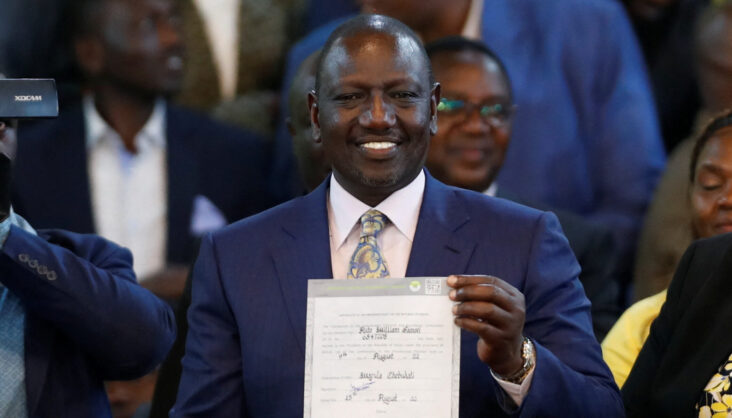[ad_1]
However, his main rival in the election, former Prime Minister Raila Odinga, the chosen successor of outgoing President Uhuru Kenyatta, has said he will contest the results at the Supreme Court following the IEBC’s declaration.
In the lead-up to Tuesday’s election, both presidential hopefuls had promised to peacefully accept the results.
“We want peace, we shall accept the decision of the Kenyan people,” Ruto said at a Sunday church service ahead of the polls.
Raila made similar remarks.
“We will accept the outcome,” he said. “If we win, we will celebrate, and if we lose we will also congratulate the winner because that’s what democracy is all about.”
Whether it’s Raila Odinga or William Ruto, let there be peace. We have structures of solving electoral disputes. Kenyans must get back to work and support whoever gets elected. Incase of dispute, let the court solve it. Incase of run off, let’s meet in grassroots. Let’s be real.
— Abuga Makori EGH, MBE (@abuga_makori) August 15, 2022
IEBC at centre of new twist
On Monday, William Ruto arrived at the national tallying centre in Nairobi expecting to be declared winner, but the announcement was delayed by several hours.
Raila Odinga’s chief agent Sitiabao Kanchory later called a press conference disputing the results, saying they were unverifiable.
Saitabao Ole Kanchory: We have intelligence reports that their system was penetrated and hacked and that some of the IEBC officials actually committed electoral offences and some of them ought to have been arrested if they were not arrested #KenyaDecides2022 #KenyasChoice2022 pic.twitter.com/Up2n5gZmVU
— Citizen TV Kenya (@citizentvkenya) August 15, 2022
Four out of the seven IEBC commissioners also addressed the media distancing themselves from the results that were to be announced earlier in the day by their chairperson, Wafula Chebukati.
Kenyans had been kept waiting from 3pm (Kenyan time) when the IEBC said it would announce the results.
The announcement was made three hours later.
Low turnout
The election was marked by relatively low voter turnout that cost the 77-year-old Raila dearly as young Kenyans stayed away in droves, put off by their leaders’ failure to deliver on their promises.
Raila, a perennial opposition candidate running for the fifth time, took a different approach this time by hitching his wagon to President Uhuru Kenyatta, the son of the late independence hero and Kenya’s first president, Jomo Kenyatta.
Preliminary tallies however showed that the president’s endorsement failed to deliver the vote from Kenyatta’s Kikuyu ethnic group, Kenya’s largest, with just one in five voters choosing Raila in their traditional stronghold of central Kenya.
Raila’s choice of running mate, former Justice Minister Martha Karua, which was expected to appeal to female voters, also failed to rally this huge voting bloc behind him.
Official results from the IEBC showed that Ruto garnered more votes than Raila not only in Karua’s backyard of Kirinyaga County, but also President Kenyatta’s polling station.
It was not so much about Karua, but about President Kenyatta who many voters in the region felt had betrayed his deputy and instead opted to support his fierce rival Odinga.
Analysts say the vote-rich Mt Kenya region may have voted for Ruto in protest of Kenyatta, who – years back – had rooted for Ruto to succeed him, but later changed tune after his 2018 handshake with Raila.
“It was not so much about Karua but about President Kenyatta who many voters in the region felt had betrayed his deputy and instead opted to support his fierce rival Odinga,” John Charo, a political analyst, tells The Africa Report.
Since then, Kenyatta and Raila have been at loggerheads and have even traded accusations over the current economic status of the country, which is reeling under high costs of living.
Social media reactions
Kenyan citizens have taken to social media to express their desire for peace to be kept, regardless of the outcome:
The whole world is watching Kenya with keen interest and so is the ICC… International Criminal Court. Woe to any presidential aspirant whose supporters perpetuate chaos and mayhem. #KenyaDecides2022
— R. K. M. 7 (@RKM79) August 15, 2022
We can ALL disagree but AGREE on PEACE
#IndependenceDay #KenyaDecides2022 pic.twitter.com/1VCObFYpr2
— Jill Naswa (@JillNaswa) August 15, 2022
Whether it’s Raila Odinga or William Ruto, let there be peace. We have structures of solving electoral disputes. Kenyans must get back to work and support whoever gets elected. Incase of dispute, let the court solve it. Incase of run off, let’s meet in grassroots. Let’s be real.
— Abuga Makori EGH, MBE (@abuga_makori) August 15, 2022
We’ll continue to update you on this story as it unfolds
[ad_2]
Source link
